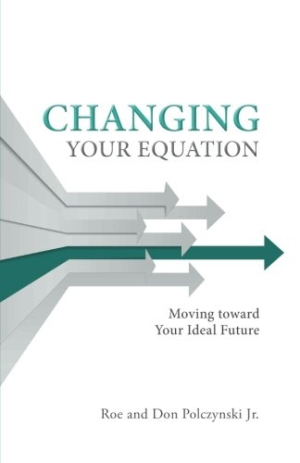Changing Your Equation
Moving toward Your Ideal Future
A positive motivational tone, combined with expert advice and useful tools, makes Changing Your Equation an excellent book.
Roe and Don Polczynski’s Changing Your Equation is a smart, action-oriented guide to self-assessment and self-leadership.
After a heart-to-heart discussion, the Polczynskis decided that they needed to change their life’s direction if they were to achieve their goals. This epiphany resulted in Changing Your Equation, which explains how to take control of one’s life by becoming an accountable leader and building an “ideal future.”
This leadership concept, based on the authors’ personal experiences and their combined business management expertise, offers a sensible, positive approach to self-improvement.
Changing Your Equation is divided into three sections: “Life Elements,” “The Realities,” and “Change Agents.” Each section contains relatively short chapters that walk through topics in clear, concise language. “Life Elements,” for example, covers relationships, values and ethics, education and lifelong learning, finances, and career.
Each chapter closes with an engaging and encouraging exercise; the chapter on finances, for example, includes a “personal balance sheet” and a “personal budget template” to be completed in order to facilitate better personal financial planning.
The section “The Realities” presents a deep dive into one’s personality and interactions with others. The counsel here is wise, simply stated, and at times blunt: “Speak less. Ask more. Listen carefully.” This section offers valid insight into how to develop positive attitudes about self-leadership.
“Change Agents” is the most intriguing section of the book. Here, the authors concentrate on elements that can truly move an individual forward. The chapter “Brand Your Future,” for instance, covers a topic not often addressed in self-improvement books: one’s personal brand, which includes physical appearance, personal presentation, verbal communication, and correspondence skills.
Another chapter, “Climb the Belief Ladder to Find Your Sense of Purpose,” uses a very effective metaphorical ladder to identify and describe belief “rungs” that can act as change agents. Each of the chapters in this final section is accompanied by anecdotes from either Roe or Don about their own experiences, a nice touch that personalizes the content.
The three sections of the book build, one upon the other, into a single strong, cohesive message about self-leadership. The Polczynskis offer specific strategies, as well as meaningful exercises and relevant stories, throughout the book.
They realistically assign responsibility for one’s “ideal future” to each individual but exhort the person to act: “Changing your equation comes down to not only finding the joy, meaning, and purpose in your life but also activating it and putting it into real action.”
It is this positive motivational tone, combined with expert advice and useful tools, that makes Changing Your Equation an excellent book.
Reviewed by
Barry Silverstein
Disclosure: This article is not an endorsement, but a review. The publisher of this book provided free copies of the book and paid a small fee to have their book reviewed by a professional reviewer. Foreword Reviews and Clarion Reviews make no guarantee that the publisher will receive a positive review. Foreword Magazine, Inc. is disclosing this in accordance with the Federal Trade Commission’s 16 CFR, Part 255.

